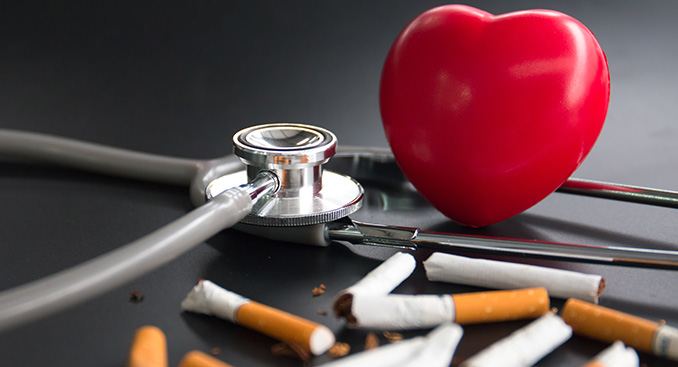Resolve to Quit Smoking This Year: Here's Why

Of all the resolutions you could make, quitting smoking might be the most life-changing goal you could set. Breaking the habit will benefit not only your life, but the lives of your family members and your community.
“Most people know smoking is ‘bad for you’ and associate it with an elevated risk for lung cancer, but there are many more health benefits you'll reap when you choose to quit,” says R. Douglas Adams, MD, a cardiothoracic surgeon with TriHealth Heart Institute.
Here are just a few of the many reasons to quit smoking this year:
Lower Risk of Heart Disease
When people think of smoking, they often consider it a habit that impacts lungs. In reality, it affects all your organ systems, including your heart. This is because of the carbon monoxide in cigarette smoke.
"Once in your lungs (carbon monoxide) is transferred to your bloodstream," according to the American Heart Association. "Carbon monoxide decreases the amount of oxygen that is carried in the red blood cells. It also increases the amount of cholesterol that is deposited into the inner lining of the arteries which, over time, can cause the arteries to harden. This leads to heart disease, artery disease and possibly heart attack."
However, within 12 hours of your last cigarette, the carbon monoxide levels in your blood return to normal. Within a year, your risk of developing coronary heart disease will be 50 percent lower, according to the AHA. And by one year post-smoking, your risk of coronary heart disease will be the same as someone who has never smoked.
Improved Lung Function
You might not realize how much smoking has impacted your breathing until you stop.
Within hours of your last cigarette, you'll begin experiencing the benefits of smoke-free lungs, including improved circulation and breathing, less coughing and lower risk of infection. You'll also be able to exercise longer and have less shortness of breath, which means your overall health and fitness will improve.
Reduced Cancer Risk
About 90 percent of all lung cancers are smoking-related. But smoking doesn't cause only lung cancer. Other cancers associated with smoking include cancers of the bladder, cervix, esophagus, pancreas, larynx, throat and mouth.
The American Heart Association estimates that by five years post-smoking, your chances of developing about half of these cancers will be reduced by 50 percent. By 10 years post-smoking, you'll be half as likely to die from lung cancer.
More Money in your Wallet
When you nickel-and-dime away your money on packs of cigarettes, you might not realize how much that cost adds up.
Using the cigarette cost calculator on smokefree.gov, you can estimate how much you spend on cigarettes by the day, month and year. On average, a smoker who pays $7 for one pack a day would spend more than $2,500 per year on cigarettes.
Protection for Loved Ones
Smoking doesn't harm only you, it harms those you smoke around.
“When you stop smoking, you'll immediately benefit the health of your family members and reduce the chance that your children will become smokers one day,” Dr. Adams points out.
People who have been frequently exposed to secondhand smoke have a higher risk of lung cancer, heart disease and breathing problems, according to smokefree.gov. Pregnant mothers are more likely to have babies with low birth weight. Children are more likely to have lung infections, bronchitis, pneumonia, ear infection and sudden infant death syndrome.
Increased Survival by Early Detection
While it’s never too late to reap the benefits of quitting, Dr. Adams points out that those with a history of smoking are already at an elevated risk of lung cancer and should talk to their doctor about scheduling a lung cancer screening.
“Because lung cancer symptoms often don’t appear until advanced stages, early detection is important to increasing the chances of survival,” he says. “Those who meet the criteria for increased risk really should be screened as early as possible.”
To learn more about lung screening and smoking cessation classes, call the TriHealth Lung Cancer Screening program at 513 865 1145 for more information. Most private health plans, Medicare and Medicaid, cover lung cancer screening for patients who meet the criteria. Take this online quiz to see if you meet the criteria and would benefit from a lung cancer screening.